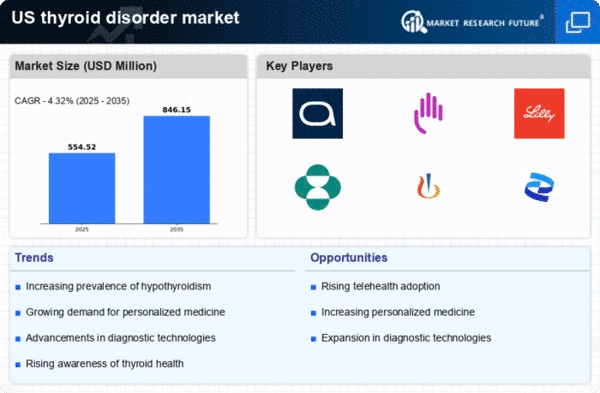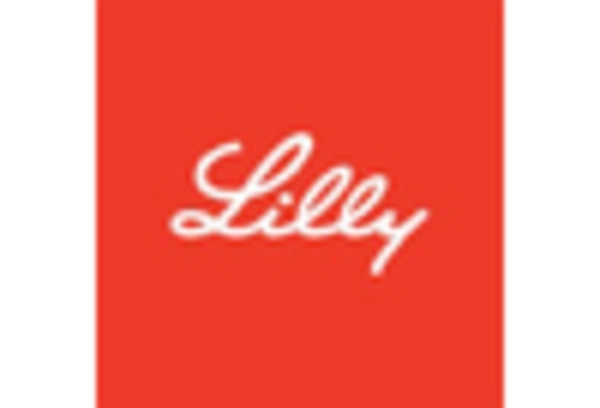Rising Healthcare Expenditure
In the US, rising healthcare expenditure is a significant driver of the thyroid disorder market. Increased spending on healthcare services, including preventive care and chronic disease management, is facilitating better access to diagnosis and treatment for thyroid disorders. According to the Centers for Medicare & Medicaid Services, national health spending is projected to grow at an average rate of 5.4% annually, reaching nearly $6 trillion by 2027. This financial commitment to healthcare is likely to enhance the availability of innovative therapies and improve patient outcomes in the thyroid disorder market. Consequently, stakeholders in the healthcare sector are expected to capitalize on this trend to expand their offerings.
Advancements in Diagnostic Technologies
Innovations in diagnostic technologies are significantly impacting the thyroid disorder market. The introduction of advanced imaging techniques and laboratory tests has improved the accuracy of thyroid disease diagnosis. For instance, the use of high-sensitivity thyroid-stimulating hormone (TSH) assays has enhanced the detection of thyroid dysfunction at earlier stages. This advancement not only facilitates timely intervention but also increases patient awareness and engagement in their health management. As a result, healthcare providers are likely to adopt these technologies more widely, further driving the growth of the thyroid disorder market. The market for diagnostic tools is expected to witness a substantial increase, potentially reaching $2 billion by 2027.
Growing Demand for Personalized Medicine
The thyroid disorder market is witnessing a shift towards personalized medicine, which tailors treatment plans based on individual patient profiles. This trend is driven by advancements in genetic testing and biomarker identification, allowing for more effective and targeted therapies. Patients are increasingly seeking treatments that align with their specific genetic makeup, leading to improved outcomes and satisfaction. As healthcare providers adopt personalized approaches, the thyroid disorder market is likely to expand, with a projected growth rate of 4% annually. This shift not only enhances patient care but also encourages pharmaceutical companies to invest in research and development of tailored therapies.
Increasing Prevalence of Thyroid Disorders
The thyroid disorder market is experiencing growth due to the rising prevalence of thyroid-related conditions in the US. According to the American Thyroid Association, approximately 20 million Americans have some form of thyroid disease, with women being affected more frequently than men. This increasing incidence is likely to drive demand for diagnostic tests and treatment options, thereby expanding the thyroid disorder market. Furthermore, the aging population is contributing to this trend, as older individuals are more susceptible to thyroid dysfunction. The market is projected to grow at a CAGR of around 3.5% over the next few years, indicating a robust demand for healthcare services and products related to thyroid disorders.
Enhanced Patient Education and Support Programs
The thyroid disorder market is benefiting from enhanced patient education and support programs aimed at increasing awareness and understanding of thyroid health. Organizations and healthcare providers are implementing initiatives to educate patients about the symptoms, risks, and management of thyroid disorders. These programs are crucial in empowering patients to seek timely medical attention and adhere to treatment regimens. As awareness grows, the demand for diagnostic and therapeutic options in the thyroid disorder market is likely to rise. This trend is expected to contribute to a more informed patient population, ultimately leading to improved health outcomes and market growth.
















